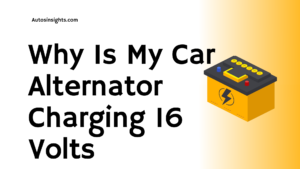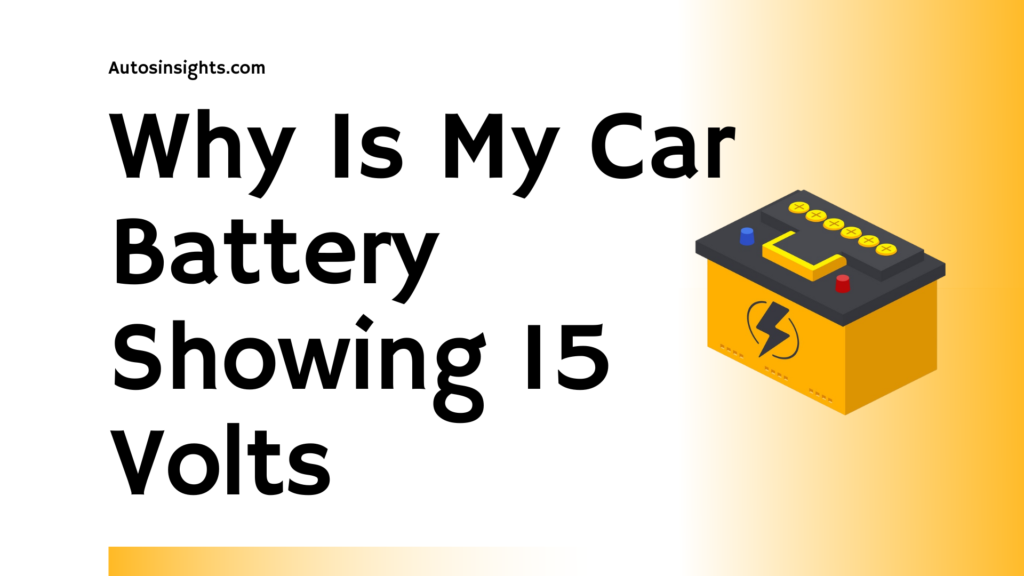The alternator is a very important part of the car, which charges your car battery while driving. If your car alternator has some problem, it will not charge your car battery properly.
Some of the reasons I am writing below. It will help you to find out the problem with your car’s alternator.
Why is my car alternator charging at 16 volts
The quick answer is that your car’s alternator charges from 15 volts to 16 volts because of your faulty regulator. Here are a few more possibilities. The alternator itself is malfunctioning and producing too much voltage. This could be due to a faulty component within the alternator or incorrect wiring. There may be a problem with the car’s charging system, such as a alternator voltage.

BAD VOLTAGE REGULATOR
The battery voltage in a car is very important. Sometime alternator only putting out 13 volts, the car may only start or run properly if the voltage is raised. The voltage regulator helps maintain the proper battery voltage by controlling the alternator’s output.
The alternator, in turn, generates electricity to power the car’s electrical system while the engine is running. The alternator voltage should be within a specific range to properly charge the battery.
It is important to regularly check the alternator output and voltage to ensure they are within the proper range. If the alternator output or voltage is too low, it may not be able to charge the battery adequately.
The battery terminals should also be regularly checked and cleaned to ensure proper connectivity.
The charging system in a car includes the battery, voltage regulator, and alternator, and it is important to keep all of these components working correctly to maintain the proper battery voltage and power the car’s electrical system.”
Is 16 volts too high for an alternator
An alternator generates electricity for a vehicle’s electrical system and charges the battery.
The output voltage of an alternator is typically around 13.5-14.5 volts. If the voltage gauge in a vehicle is reading higher than 16 volts, it could indicate that the alternator is overcharging.
A voltage drop in the electrical system or a problem with the alternator can cause this. An overcharging alternator can damage the battery and other electrical components.
Is 16 volts too high for a car battery
If you’re seeing a reading of 16 volts on your car battery, your alternator may be overcharging the battery.
This can be caused by a defective alternator or one that is not operating as it should. In these cases, it may be necessary to install a new alternator to restore normal charging to the battery.
It’s important to promptly address any issues with the alternator, as an overcharging battery can lead to damage and reduced lifespan.
To ensure that your car’s battery is functioning at its best, it’s crucial to ensure that the alternator is providing the appropriate amount of charge and is in good working condition.
What Is The Maximum Voltage A Battery Can Charge
The maximum voltage a car battery can be charged depends on the type of battery and the specific charging system being used. For lead-acid batteries, a common type used in vehicles, the maximum charging voltage is typically around 14.4 to 15 volts.
If the charging system provides a higher voltage than this, it can cause the battery to become overcharged and potentially damaged.
Why is the alternator putting out high voltage
An overcharging alternator can cause battery damage and other issues with your vehicle’s electrical system. Is the alternator is overcharging, it can put extra strain on the engine block and potentially cause problems with the engine running smoothly.
It is important to have a car alternator that is operating correctly to ensure your vehicle’s overall health and performance. If you suspect your alternator is overcharging, it’s important to check it out with an auto mechanic or mechanic’s assistant as soon as possible.
An auto mechanic’s assistant is a trained professional who can diagnose and fix issues with your car’s alternator and other systems. Welcome to auto mechanics and the importance of properly functioning car alternators!
How do I know if my alternator is overcharging
An alternator is a device that generates electricity for a vehicle’s electrical system by converting mechanical energy into electrical energy.
It uses the engine’s rotation to spin a set of coils, generating an alternating current. However, if the alternator is overcharging, it can produce a higher voltage than is necessary for the vehicle’s battery and electrical system.
Check this list in which I have pointed out some reasons.
- The alternator generates electricity for a vehicle’s electrical system.
- The alternator converts mechanical energy into electrical energy.
- Alternator uses the engine’s rotation to spin a set of coils.
- An overcharging alternator can produce higher voltage than necessary.
- Overcharging can damage a vehicle’s electrical components and potentially lead to a fire.
- Regular maintenance and checks are important to ensure safe and efficient operation.
- Signs of overcharging include flickering headlights, a burning smell, and a dead battery.
- If experiencing these symptoms, it is important to have a mechanic diagnose and fix the issue to avoid further damage.
- The alternator overcharging can cause high voltage output.
- When the alternator operates, it generates electricity for the vehicle’s battery.
Should my alternator put out 15 volts
A normal range for the voltage output of an alternator is between 12.6 volts and 14.5 volts. A result of 15 volts is considered high and could cause damage to the electrical components of the vehicle.
It is important to have the alternator checked by a mechanic if you are experiencing an output of 15 volts or higher.
If you have recently installed a new battery in your car and are still experiencing voltage issues, there could be some causes.
One possibility is that there is a problem with the alternator responsible for charging the battery. The alternator could fail or overcharge, resulting in a voltage output that is too high or too low.
Another potential cause of voltage issues could be trouble codes or error messages displayed on the car’s computer system. These codes could indicate a problem with the electrical system, such as bad ground or a faulty component.
How to reduce alternator output
To reduce the alternator’s output on a vehicle, you should first ensure that the battery is fully charged. If you have a fully charged battery, it can cause the alternator to work harder and produce more output.
You can use a voltmeter to check the charge of the battery. If the battery is low, you should charge it before attempting to reduce the alternator’s output.
Once you have verified that the battery is fully charged, try turning off any lights or electrical accessories that may be causing the alternator to work harder.
You should also double check that all connections are secure and in good condition. If you need help with this, you can refer to the owner’s manual or consult a mechanic.
If you still have trouble reducing the alternator’s output, you may need to replace the alternator.
Pearl Wilson, a mechanic, recommends finding a replacement alternator specifically designed for your vehicle’s make and model. This will confirm that the new alternator is compatible with your engine and will not cause any problems.
What is the highest voltage An alternator can produce
The highest voltage that an alternator can produce depends on its design and specifications. Some alternators are capable of producing up to around 28 volts of electricity.
However, it is important to note that it is not safe to operate an alternator at its maximum voltage for extended periods of time.
If the alternator produces a high voltage, it may signal that it needs to be repaired or replaced. To ensure that the alternator is functioning safely, it is essential to regularly test its amperage output and check for any signs of overheating.
If you suspect that your alternator may malfunction, it is recommended to have it professionally checked and repaired if necessary.
When working with an alternator, it is also important to follow safety guidelines, disconnect the power source, and unplug any electrical components before attempting to make any repairs.
If your alternator is still under warranty, it is generally a good idea to have it repaired or replaced through the manufacturer to maintain security.
Does the alternator charge at idle
Yes, an alternator can charge a car’s battery while idling. However, the alternator typically sets the battery at a higher rate when the vehicle runs at higher RPMs.
If the alternator is not charging the battery properly, it may need to be replaced. It is important to switch off any electrical devices, such as the radio or headlights, when the car is idling to prevent the battery from draining.
If the battery is not charging, it could be a problem with the alternator or the starter. Sometimes, the alternator belt may need to be tightened or replaced if it slips.
Excessive heat can also cause the alternator to malfunction, so it is important to make sure that it is not getting too hot. Suppose the alternator is not charging the battery, and all other potential issues have been ruled out. In that case, connecting a diagnostic tool to the car’s computer may be necessary to troubleshoot the problem.
The battery charging system can also be checked by using a multimeter to test the alternator’s voltage output. If the alternator is not charging the battery properly, the dashboard warning light will typically turn on, indicating a problem with the charging system.
How do I know if my alternator is dying?
Here are some ways to determine if your alternator is dying:
- Pay attention to your car’s warning lights. If the “ALT” or “GEN” light on your dashboard is illuminated, it could indicate a problem with your alternator.
- Check the voltage of your car’s battery using a voltmeter. If the reading is below 12.5 volts, it could indicate that your alternator is not providing enough power.
- Start your car and turn on the headlights, heater, and other electrical accessories. If the headlights become dim or the heater stops working, it could be a sign that your alternator cannot keep up with the power demand.
- Have a professional mechanic diagnose and fix any issues with your alternator to ensure the safety of your car.
Some more reasons
Dead battery
If your alternator is not providing enough power, your battery will eventually run out of charge, and your car will not start.
Electrical issues
A dying alternator may be unable to keep up with the demand for power from your car’s electrical systems, leading to issues such as dim headlights, malfunctioning wipers, and inoperative power windows.
Engine problems
In severe cases, a failing alternator can cause your car’s engine to stall or misfire, potentially leading to more severe issues.
Conclusion
I have written all the possible reasons Why my car’s alternator charges 16 Volts. Now you have to check what is your reason for this problem.
Related Articles:
- What Happens When You Shake A Car Battery
- Can I Clean Car Battery Corrosion With Baking Soda
- How Long Does It Take To Change a Car Battery
- Does Driving Charge Your Car battery
- How To Kill A Car Battery – 2023 Guide
- Is It safe to Replace Your Car Battery In The Rain
- Why Is My Car Battery Showing 15 Volts
- Can I Leave My Car Battery Disconnected Overnight
- How Long Does It Take To Change A Car Battery
- Why Does Car Battery Sloshing Sound
- Can You Touch a Positive Terminal Of A Car Battery
- How To Drain Car Battery
- Car Battery Dies After Getting Gas
- Can A Bad Battery Cause Low Voltage



